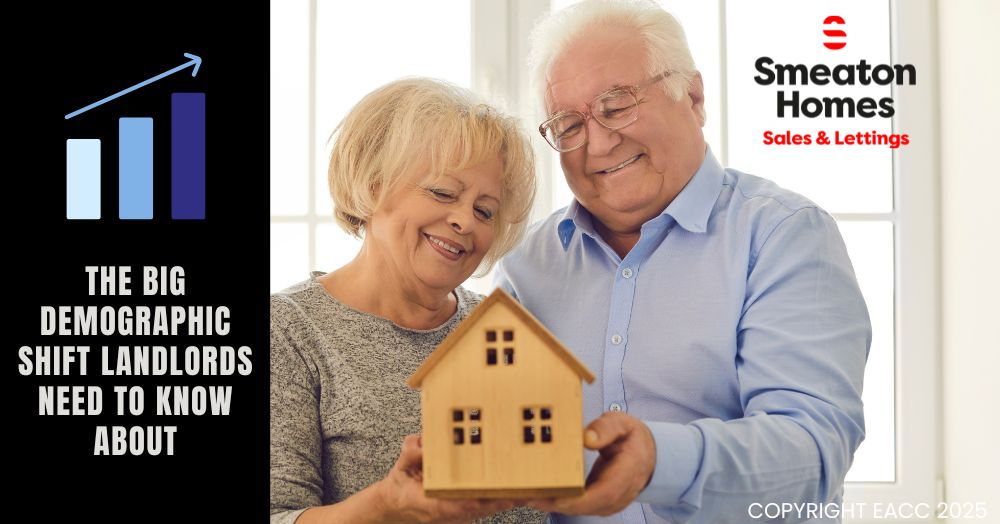
The Important Demographic Shift Landlords Need to Know About
Old stereotypes about tenants are going out the window as the number of renters aged over 55 continues to grow.
When you think of a ‘typical renter’, what comes to mind?
A young professional, a university student – or how about someone in their 50s, 60s or 70s?
The latter demographic – older renters – is an often overlooked but growing phenomenon in the rental market.
In the past decade, the number of rental properties headed by someone aged between 55 and 64 grew by 66%.*
In the next age bracket up, those aged 65 plus, the rise was 33%.
This growth means there are now more than 867,000 households headed by over-55s living in private rented accommodation.**
Given we have an ageing population and property prices continue to rise, industry experts expect this trend to continue.
What’s behind the change?
There are several reasons why an increasing number of older people are renting.
Some find themselves returning to the private rental sector after owning a property due to a change in personal circumstances, such as divorce or separation.
However, many have never owned their own home and are unlikely ever to do so. (This is attributed to plummeting housing affordability in recent decades.)
Even when older tenants can get the funds together for a housing deposit, banks view mature buyers as a greater risk.
Institutions are often unwilling to lend to over-50s or set such short repayment terms that a mortgage just isn’t feasible.
So even if you have a stable job, earn a good income and have a deposit, your age may preclude you from becoming a homeowner.
What does this mean for landlords?
Older tenants (providing they meet the usual credit and reference checks) can be an attractive prospect for landlords.
Renting to an older person can provide an opportunity to establish a longstanding relationship that provides security and certainty for both parties.
Lower tenant turnover
When older tenants get settled in a property, they tend to stay, meaning fewer void periods and lower tenant selection costs for landlords.
Data shows 23% of tenants over 45 have lived in their current rental home for more than a decade. While 22% had been in the same rental for between five and ten years.*
Caring for the property
Long-term tenants tend to take better care of properties, meaning less damage and wear and tear.
Of course, landlords need to be vigilant and conduct periodic inspections. However, generally speaking, older tenants are more likely to lead quieter lives.
Catering for older tenants
Despite the growing presence of older people in the rental sector, many believe the market is falling short when it comes to serving them.
Last month, Propertymark urged the government to develop a strategy to better support older tenants in both the public and private sectors.
It identified accessibility and energy efficiency as two areas that needed improving.
What can landlords do to attract older tenants?
There can be quite a big difference in the lifestyle and needs of a 55-year-old compared to a 75-year-old.
However, here are some general issues to consider when trying to cater for more mature tenants.
Flexibility
If a tenant aspires to stay in your rental property for five, ten or maybe even 20 years, they’re most likely going to want to make minor changes so that it really feels like home.
Consider taking a flexible approach to decorating, hanging pictures or handrails, or planting in the garden.
Pet ownership
As 36% of dog owners are over 55***, being able to keep a pet may be a top priority for older tenants.
Interestingly, a higher proportion of older tenants live alone, so their dog or cat (or hamster or budgie) may be an all-important companion.
Energy efficiency
As older people are likely to spend more time at home, heating costs are bound to be a concern.
Double-glazing, solar panels and heat pumps – if they keep bills down, they will be welcome.
Accessibility
If your rental property rates highly in terms of accessibility, be sure to highlight this in your marketing.
Step-free access, walk-in showers, off-street parking and open-plan layouts are all desirable features.
Maintenance
When tenants aged 45 and older were asked what they liked best about renting, not having to be responsible for repairs came out on top.*
That’s not to say that older renters don’t care about maintenance; it’s usually a major concern. It’s just that they’ll be delighted it’s you, not them, having to deal with it.
However, they’re likely to expect a prompt response when they raise issues regarding the state of the property.
If you’d like advice about how to manage or let your rental property, get in touch with us today or visit our website smeatonhomes.co.uk.
Know someone who would find this article useful? Please share it with them.
* Source: Paragon Bank
** Source: National Housing Federation
*** Source: PDSA